My Father-In-Law, Alex Best, is a retired fisherman. This is part of his fishing stage. Here he mends gear and, sometimes, boats. See the speedboat out in front? It is a work-in-progress. It was owned by Joe Emberley, who passed away a few years ago. It’s now the property of his daughter, Patricia, who’s married to my brother in law. He plans to fix it up in time for the food fishery which starts up again in a few weeks.
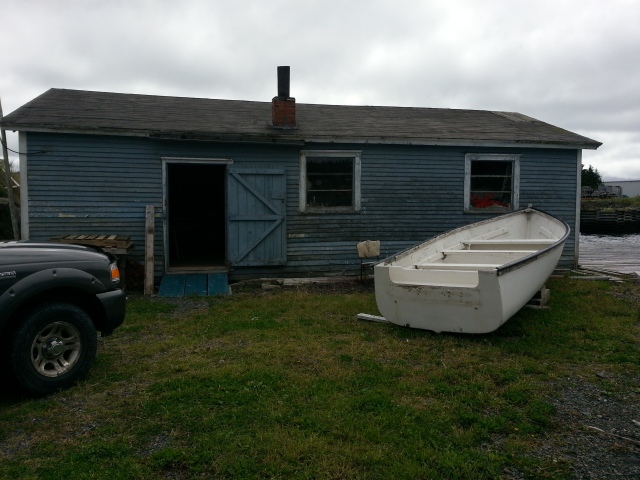
And this is the ‘back stage.’ Alex sold most of his catch at the nearby fish processing plant. If, however, he chose to process some of it himself this is where he would do it.
It’s covered with ochre, which was mixed with cod liver oil and painted on. That’s the way it’s always been done. Ochre is non-poisonous and very effective in preserving the wood. Cod liver oil is natural. How many paint jobs can claim to be environmentally friendly? This one can. In days past Alex’s father, John, (and his fathers before him) prepared most of his fish there. The cod was headed, gutted, cleaned and salted. The salted fish would then be dried on wooden platforms called flakes and packed into barrels, then subsequently sold. This age-old tradition was what kept Newfoundland’s economy moving since the early 1500’s (or maybe even earlier–who knows).
Dried Salt cod kept well, was cheap and nutritious. It kept bellies filled, particularly those of European soldiers and of the slaves who worked the Caribbean sugar plantation. Conditions on those plantations were awful but the plantations were hugely profitable for the owners. Around the time of the French revolution the sugar production from Haiti alone accounted for approximately 40% of sugar usage in England and France and 40% France’s exports! Its safe to say that sugar was to the eighteenth century economy roughly what petroleum is to that of the present day. And, just like today those that directly produced it benefited little from it; not the fishers who worked here and not those who toiled in the sugar cane fields. Greedy, powerful people elsewhere got rich, whether it was from selling sugar or fish. That never changes. And now the North Atlantic fish are mostly gone and Haiti’s land, economy and culture are in tatters all due to centuries of poor stewardship on behalf of all involved.
Back to the stage. It’s a working building.
Inside, there’s a cast-iron stove. It’s not needed now. Later on through the fall and winter when Alex is down here knitting lobster pot heads, repairing fishing gear and roping nets he’ll appreciate the heat.
That big pail doesn’t get much use now but it was once used every day on board the boat, for washing fish.
What do you suppose this big wooden ‘hammer’ was used for?
Hand lines. Gear for a sustainable fishery. They’ll give you enough–as opposed to “all of it.” It’s hard on the hands if you are not wearing gloves.
Up in the rafters you can see the name plate from Alex’s last fishing boat, the Blue Dawn. He and his son Brendan built it just before the cod moratorium came in so it never got as much use as they’d intended. It was around 32 feet long and was powered by a 180 Hp Volvo Penta Diesel.
Alex sold it a few years back. He’s retired from the fishery. His licence was bought out…for a song. The Federal Government wanted people like him out of the fishery.
His heart is still very much there, though. An occupation, a craft and all the associated skills were honed over a period of around 60 years. You don’t just turn it off like a light bulb when it’s done; it’s become a part of who you are.
What’s that? An old sail. Hasn’t been used in a long time. There’s an oar and a gaff there too.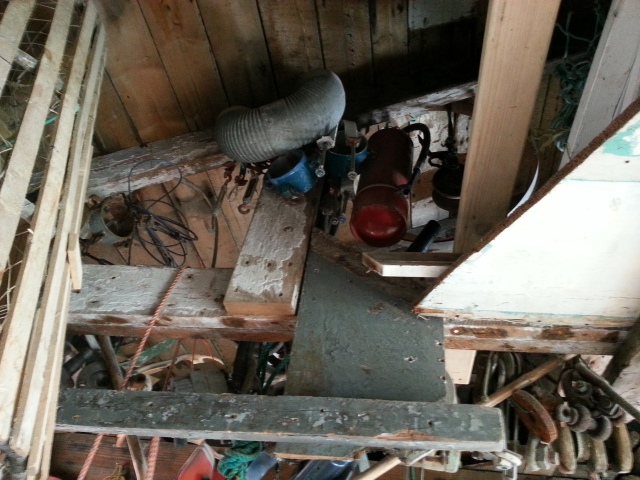
Not an inch of ceiling space is wasted.
Rope and some gear is stored up there too but Alex sold most of the fishing gear after he retired. 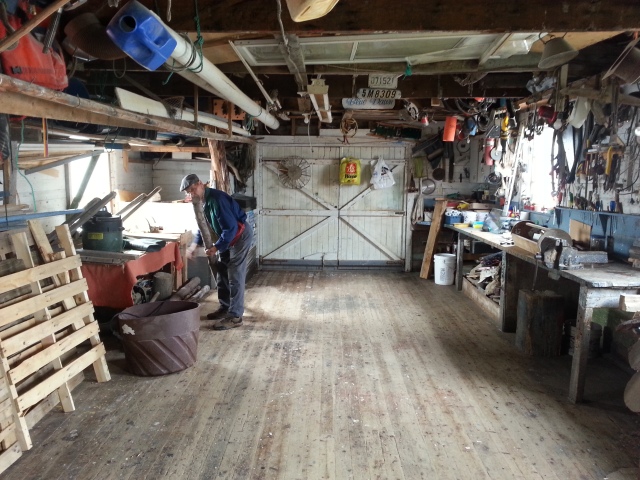
The double doors open out onto the wharf. Wide enough to get a boat through if you make the effort. Alex is there now, making room for…something.
All along the sides you find stuff. There’s even a small flat-bottomed-boat stored there. It was always carried on the stern of the Blue Dawn just in case.
You’d be surprised what Alex can make from those old pallets. Maybe you’ll see some of it in the next post.
Can you see the partially dried fish? It’s just a bit for food. It’s misty out right now. If the sun was out, the fish would be outside drying and curing.
And this is a working shed. Tools and supplies are everywhere; everything where it should be.
Even an old hauler.
Now you see the fish, right? They are fairly small codfish thanks to modern fishing technology. Stern draggers with their 6000 hp engines and otter trawls (giant dragged net cones, with mouths 25-30 metres wide held open by huge steel ‘doors’) indiscriminately scoop everything in their path. And kill it–all of it, the stuff that’s wanted and the stuff that’s not. Bycatch they call the stuff that’s not wanted. It’s generally just thrown away. Once living things; potential food–just thrown away. All the while the steel doors that keep the trawl open bang and scrape, bulldozer like, across the ocean bottom, destroying habitats that took thousands of years to form.
Thanks to generations of Foreign over-fishing partially enabled by Canada’s lack of will to take ocean stewardship seriously–hey, Ottawa apparently has much more important things to deal with than a few puny fishies and a few silly Newfoundlanders and Labradorians–there are precious few living things left in our once-abundant waters.
And what we have left is small. We’ve pretty much knocked it off. The rest of the world…well, to them the Grand Banks are just too tasty a morsel. And Ottawa–too stupid, apathetic, arrogant and cowardly to do anything about it
I digress.
The motors belonging to Alex’s old speedboat; you met it earlier, sawed up in the grass.
Back outside. Notice that the white speedboat is now gone? Do you see that small wooden passage at the right of the shed? It seems hardly wide enough to let a one tonne 2.5 metre wide, 6 metre long boat through.
But that’s exactly what happened. We tipped it on its side and shoved it through that small spot onto the wharf where we turned it around and brought it through the double doors. We strained the rail a bit as you might imagine; nothing a few new nails didn’t fix.
This is a working shed. My Brothers in Law are losing no time in stripping away the rotten wood from the gunwales. It will all be replaced and the boat will be gel-coated, hopefully in time for the food fishery in a couple of weeks.
They’re not commercial fishers–one’s a welder and the other’s a nurse–but they’ve both got salt water in their veins, just like their father. There’s pressure on fishers to stop–that is, to stop doing it right; sustainably. You can’t stop the spirit, though. It’s alive and well and the proof is in the picture above.
Time to head back up toward the house.
Passing Alex’s other work shed. More pallets. Would you like to know what he does with them? Looks like he’s inside.
Time for a visit.
And, by the way, the big wooden hammer is a stake maul, used for driving sharpened fence posts into the earth.

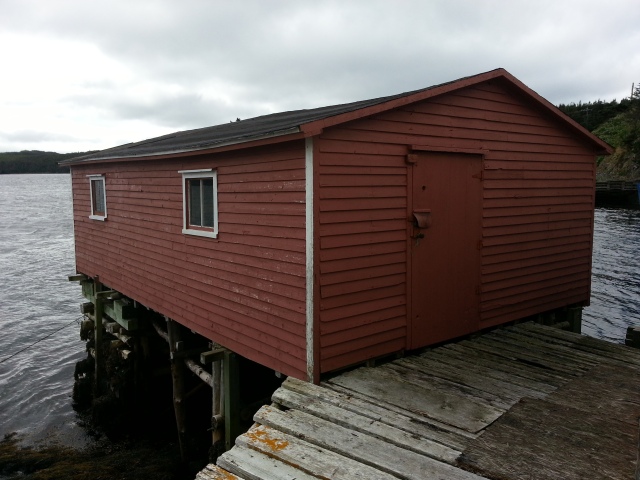
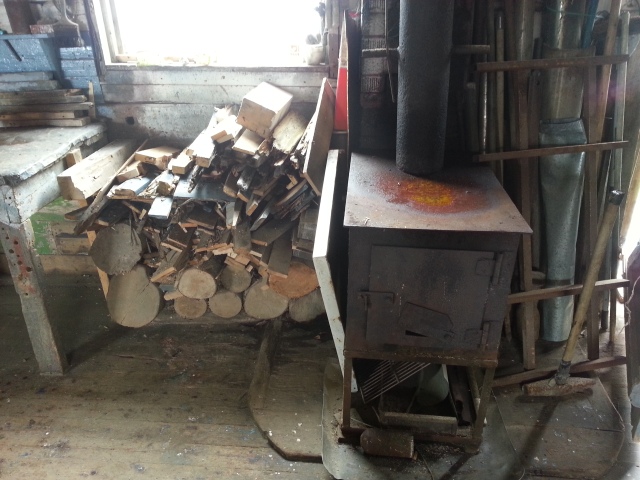
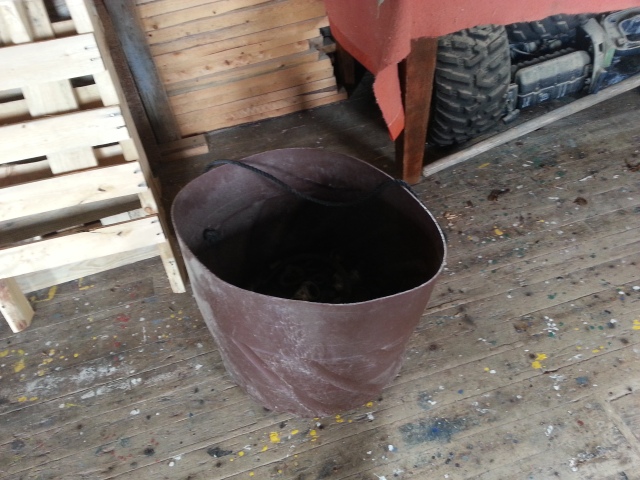
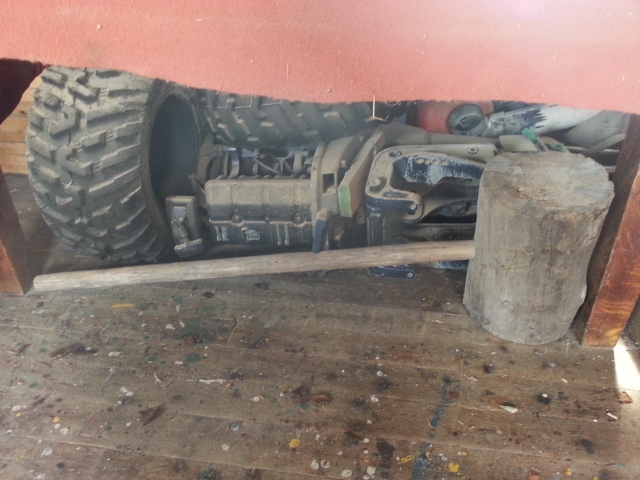
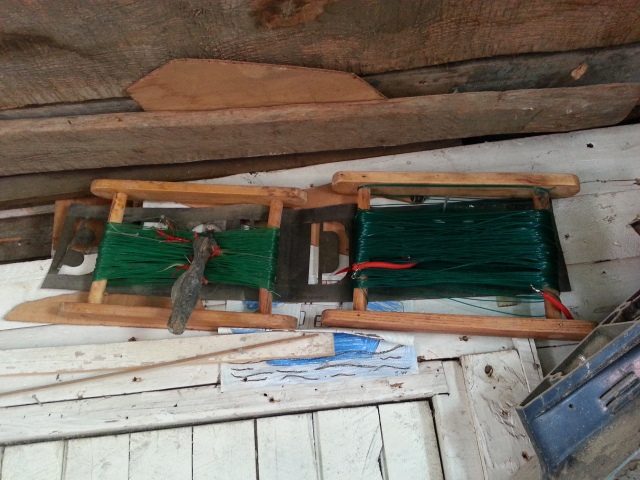
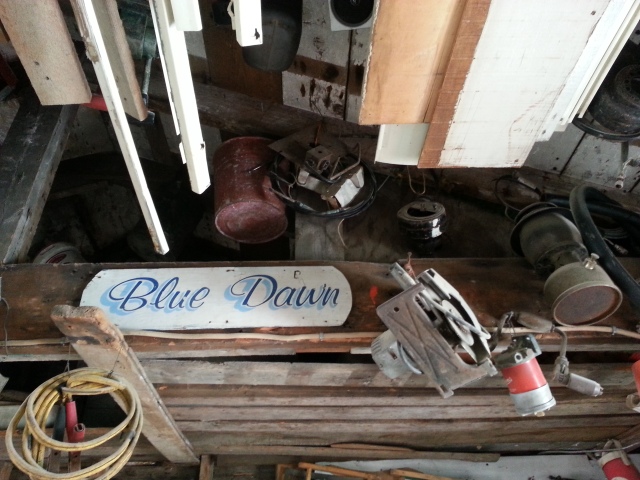
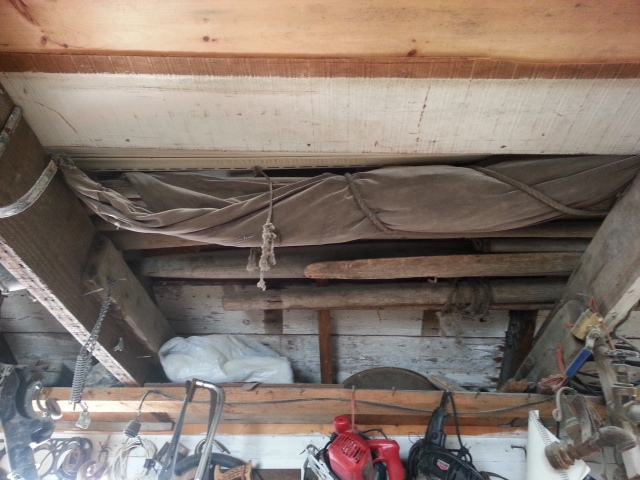
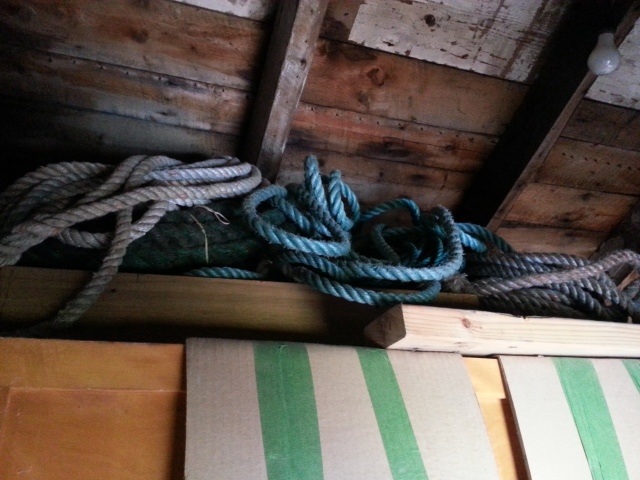
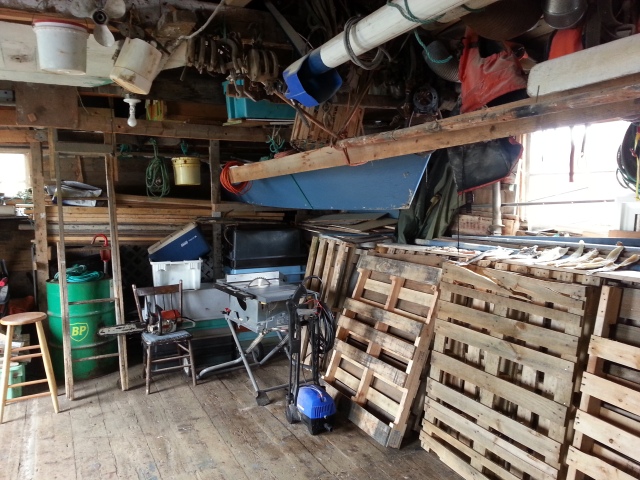
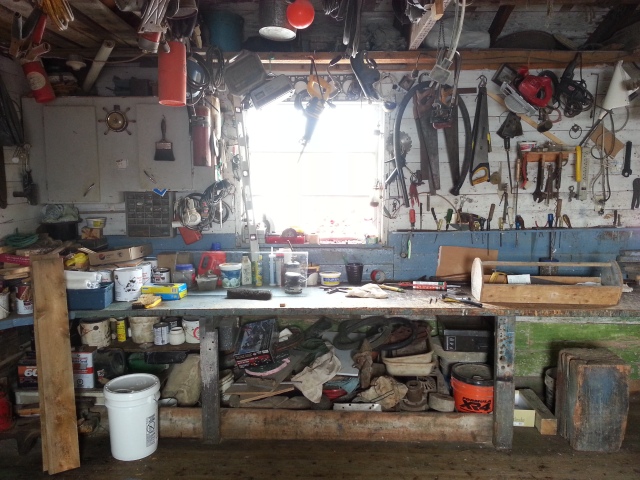
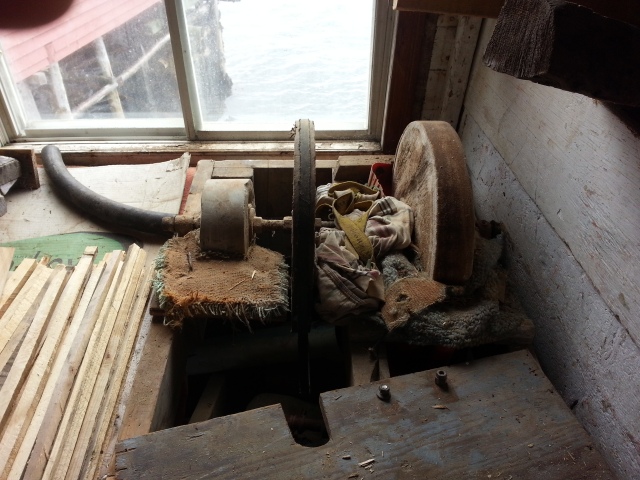
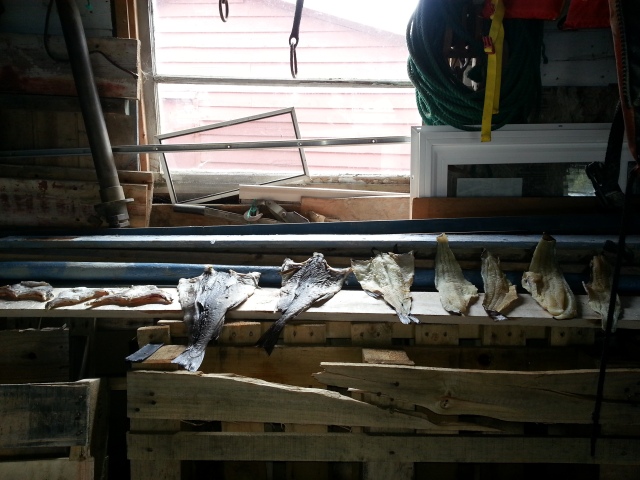
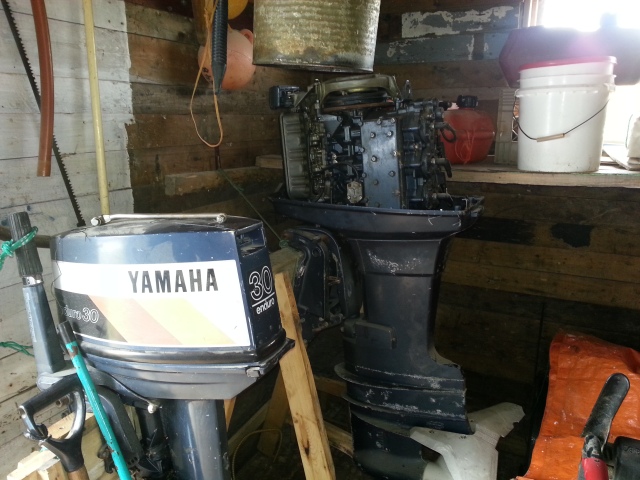
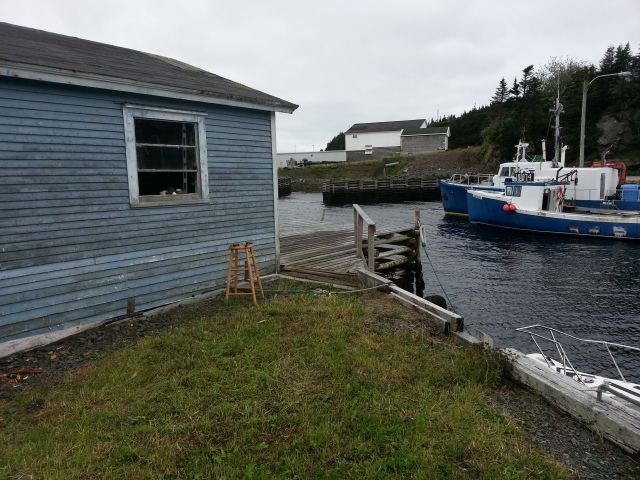
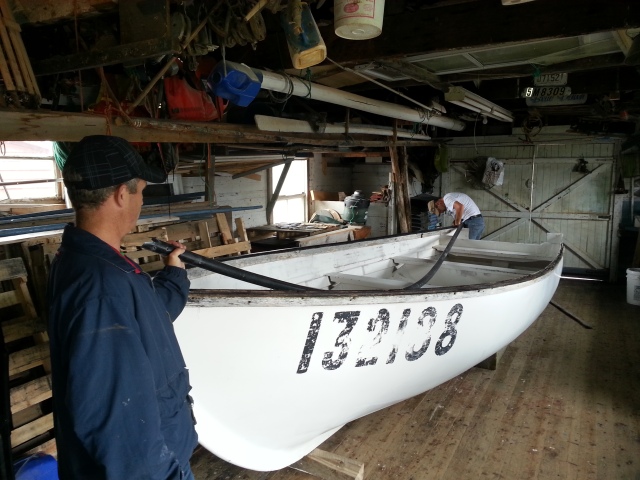
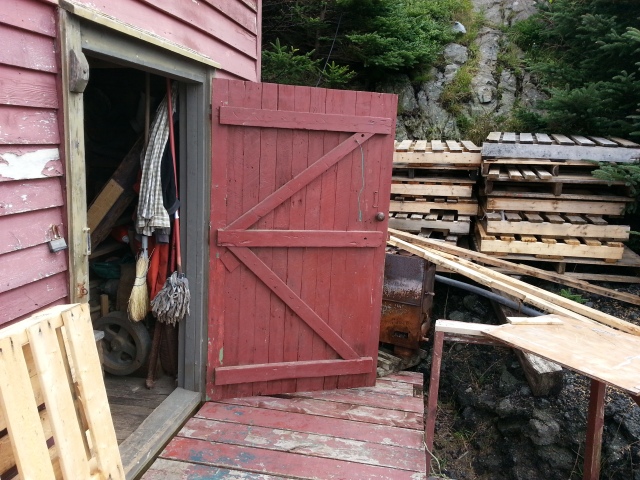
You describe a way of life that seems to be holding on, just barely. You say that neither brother-in-law fishes for a living; which suggests, in very much the same way that the ‘family farm’ has all but gone extinct, the small-play fisherman may be rapidly disappearing as well. The scale upon which the commercial fisheries is now carried out, as you have argued, is neither ecologically nor environmentally sustainable. The smaller-scale (practiced by many more individual stakeholders) upon which the fisheries used to be based was sustainable and better for our oceans. And your story has its parallel in the one about agribusinesses versus the family farm which produced for itself and just a wee bit more to sell. Why is it that both of these economies have settled on the bigger-must-be-better mode? So counterproductive for all but those at the very, very, top of the heap (and profiting). I believe that, in a way not unlike some of my images and posts, yours in this series are providing an increasing rare glimpse into a way of life that is, for the most part, lost. Bitter sweet. These big businesses are (in the longest term) so counterproductive. Some of us are so short-sighted with eyes only on short-term gain (and blind to longer term consequence). On a positive note … nice images, telling a story which I very much appreciate. Thanks. Eagerly anticipating a visit to the inside of Alex’s next shed. Is he constructing Bird Houses? Lobster Pots? D
The real goal we all need to be chasing is how to produce an amount that is both sustainable and personally lucrative. I believe we may already have the technology for doing that in both fishing and farming but what we lack is the ability to get the amounts and prices right.
In all fairness to big business it is not entirely at fault in all of this. We, the consumers have also to accept a large portion of the blame. Foods and other raw materials tend to be bought and sold at the lowest price so all links in the supply chain have to keep their costs as low as possible.
The current large-scale systems for food production are a direct result of exactly that.
Consider a modern day fisher. The skipper has to purchase a vessel and gear and employ a crew. The fish buyers are only willing to pay a certain price per kg so that skipper has to do whatever it takes to make that price pay a profit. This means the boat has to be large and in the water, working, all the time. Right there is the problem.
We have no enforced price controls so it’s the lowest one only. What a mess! Worse, this cannot be fixed by any country. If, for example, Canada tried to bring in price controls on fish, the next link in the supply chain would simply abandon Canada and buy cheaper product elsewhere…same for every other country. Limiting production is just as fruitless. Canada has production quotas on the Grand Banks but vessels from various parts of the EU simly dodge in over the boundary and take as much as they want, whenever they want…and neither Canada nor the EU will stop it.
Dave and Maurice – I agree to both of you … pondering a lot about self-sufficiency and ‘small family businesses’ versus ‘corporations’ myself. It is hard to find a solution to this and live a life totally in line with your own theories. As an individual you can just start somewhere, hold yourself as accountable as possible, and work on the resolution of the remaining contradictions. Whenever I evaluate any action (as a consumer, as a small business owner, as a citizen) I end up trying to create a model of the whole world or whole economy.
I am a Kindle addict, for example, and might contribute to small booksellers in my region going out of business…On the other hand, if all books would be sold digitally, we could avoid CO2 emissions from transporation. But what should be given precendence? Local business versus corporations, organic versus local, climate protection versus fair trade?
But I feel (hope?) that an increasing number of people are at least becoming aware of this and try to change their way of working and living although it is often hardly an option to quit your corporate job, only buy organic food produced in your local region etc.
Looking forward to the pictures on things created from palettes 🙂
Yes, the ‘modern’ way of life brought a lot of good but it’s also left us in a position where it’s clear that we just can’t go doing it that way. So now we have to find out a better way. We do have to keep much of what we have recently learned. In particular, despite the fact that we have clear;y gone too far in some aspects of it, The science around modern food production methods is a very big part of the reason why we now have some leisure time. In times past a fisher or farmer could produce enough for the family’s needs…and a little more to get things the farm did not produce. Now modern farms can produce many times more than the owner needs. Perhaps we have to find a way to move that figure back a bit so that it is sustainable while still profitable. In short we need more like Dave 🙂
The next part will go up later today or maybe tomorrow, depending on how much time I get . Housework and cooking are a bit demanding today 🙂
Thank you and Mr Best for giving us this tour of his workplace. Funny, growing up in this community I never got an inside glimpse into the workings of it all- perhaps because out father did not fish – at least at that point – Appreciate the photos and the story. Thanks again to you and Mr Best for sharing this story and these photos!
And threes one more story to come…maybe Sunday evening after I get the chance to put it together.
I’m sure my dad would beam with pride as he takes the journey through your writings.As someone who has taken part in this journey as his daughter I myself know what it truly means to him past and present .Thank you it means a lot ❤
Always my pleasure. I owe him so much…
Oh my, Maurice, there is so here – and in your previous posts about Home. Truly wonderful stories of social history in the making, told with skill, respect, and love. I hope you have a book in mind.
Lol this is the book 🙂
Fascinating stuff Maurice. Nice to hear about the traditions and social history of your part of planet earth 😀
Thanks! On that note i believe that not enough time is spent thinking about what parts of the past should be blended with the new. It always seems one of two things: (1) people want to bring in new things and totally disregard the past (in which case they often make dumb mistakes that a little consultation with the old timers could have staved off) or (2) people completely refuse to move forward insisting that the old way was good enough (in which they steadily become less relevant).